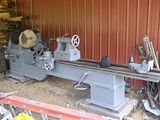Ryan I have been in your situation before and have replaced almost all of my shop with old American iron machinery. In my opinion if you have the room go for it. Your first post was asking about a lathe. I have two wood lathes and one metal lathe. My metal lathe is a 9" Southbend. Great machine but size limited. As my uncle told me when I made the decision to buy it over a larger machine, you can turn small stuff in a big lathe but its hard (not impossible) to turn large stuff with a small lathe. My larger wood lathe is an Oliver #66 and weighs around 6,000#. Not going to put that on a mobile base. Again I dont think you will regret if you have the room. I actually had to put the larger lathe in a shed on the side of my shop and need to finsih enclosing and concrete the floor but I do have it.





 Reply With Quote
Reply With Quote




